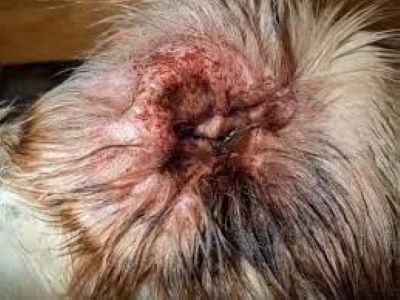Dogs tend to exhibit weird behaviour and some of these behaviours are not just normal. One such habit is your dog shaking his head, this might seem common to you but it is actually not and might make you think, “Why does my dog keep shaking his head?”
Our blog will take you in-depth with the information and explain the causes of a dog shaking their head. We will also critically examine the condition by providing you with the solution to treat and prevent it.

Why Does My Dog Keep Shaking His Head?
If your dog is shaking his head then it can be due to various reasons. Here are some reasons why your dog might be shaking his head:
Debris or water in ears
Dirt, debris, water or any object gets stuck in the dog’s ear then it can lead to shaking of their head. While playing or rolling on grass or the floor if seeds or grass get stuck in a dog’s ear then it affects their ear canals making them shake their head.
Apart from this often while bathing the water enters the dog’s ear making it enter the canal. This causes infection and irritation in the ear along with itching, pain and burning. Due to this, a dog can frequently shake his head.
Ear wax buildup
If you do not clean your dog’s ear on a regular basis and do not maintain their ear hygiene then it can lead to ear wax build-up. This wax building up the dog’s ear increases with time causing irritation and bad odour. To get relief the dog may shake the head and scratch the ear frequently.
Ear infection
Dogs suffer from ear infections[1] if their ears are not cleaned often or if water enters their ear canal. Moreover, there are also the higher chances of yeast growth in their ear which leads to yeast ear infection in them.
This infection makes the dog’s ear inflamed and causes an unusual brown discharge with odour. This causes irritation and discomfort to dogs and as a result, they shake their head.
As mentione by Amanda Simonson, DVM in petmd, "Otitis externa is the most common infection, as this part of the ear is most exposed to the outside world. Ear infections can be acute (quick onset) or chronic (recurrent). Dogs may have an infection in one or both ears."
Hematoma
Hematoma is a serious condition in dogs that occurs due to blood being collected under their skin. This happens if your dog suffers from trauma or any kind of injury in general.
If your dog is habitual to shake the head shake head constantly then it can rupture the blood vessels in the ear flap leading to hematoma in the dog. This causes swelling, and pain and can even permanently damage the ear. Due to this pain, the dog shakes its head constantly.
Brain tumour
The growth of abnormal cells in the brain causes brain tumours. This tumour affects the dog’s brain functioning and behaviours and also causes problems like seizures, vision defects, and loss of balance. This issue results in the dog shaking its head.
Epilepsy
Epilepsy is a neurological disorder that leads to seizures in dogs, this disorder affects the brain nerves of the dog. Seizures affect the movement, sensation and consciousness of the dog. Some of the symptoms of seizures are drooling, twitching, losing bladder or collapsing along with shaking of the head.
Neurological disorder
In neurological disorders[2], the nerves of a dog’s brain and spinal cord are mainly damaged. A dog suffering from a neurological disorder often shakes its head due to inflammation, infection and nerve damage.
How To Prevent and Treat Head Shaking in Dogs?

Here are some ways through which you can prevent head shaking in dogs:
- While bathing your dog make sure that the water does not enter the dog’s ear. If the ear gets wet then you should try to completely dry the ear of the dog to prevent the moisture build in the ear.
- Clean your dog’s ear regularly to prevent earwax buildup in the dogs. Cleaning your dog’s ear on a regular basis will help prevent ear infections and yeast overgrowth.
- If you notice the dirt and debris getting collected in your dog’s ear then wipe them off immediately to avoid further discomfort.
- Identify your dog’s allergies that lead to inflammation, infection or swelling of the dog’s ear. If possible then prevent it beforehand by consulting your vet.
Here’s how you can treat the head shaking in dogs:
- To treat the ear and the head shaking the dog will first identify its cause and for that, it will require physical examination.
- If it’s due to an ear infection then the vet will treat it using the ear drops medications. This will help to kill the bacterial growth in the ear and prevent the yeast overgrowth in them.
- For the treatment of hematoma, the vet will drain the blood from the dog’s swollen ear flap. After draining the blood the vet will prescribe the medication and antibiotics to reduce the inflammation and swelling.
- To treat the brain tumour, neurological disorders and epilepsy the vet will be required to do tests like MRI and CT scan. This test will help to know the severity of the disorder. For the treatment of this condition normally surgery and chemotherapy will be required.
FAQs
Why does my dog keep shaking his head?
There are a number of possible causes for your dog’s constant head shaking, including inflammation, allergies, allergens, water or debris in the ear canal, and more. Otitis externa, or ear infections, can also result in discharge and need to be treated.
What should I do if my dog keeps shaking his head?
Your dog may be indicating that something is affecting them in their ears if they are constantly shaking their head. Using a dog ear cleaner at home, letting your dog’s ears air dry after a bath or swim, or putting cotton balls in their ears to keep them from getting wet are all possible ways to help your dog, depending on the cause.
Why does my dog’s head shake involuntarily?
A dog’s involuntary head shaking can have a number of causes, including the canine distemper virus, poisonings, neurological conditions, and infections. Depending on the underlying cause, the type and intensity of the head shaking may change.
Do dogs shake their head when stressed?
Yes, at times of stress, dogs can shake their heads. Dogs who are overly excited or anxious may shake their heads and entire bodies. Even dogs occasionally sneeze. At times, it may be quite a chaotic scene.
When should I take my dog to the vet for head shaking?
Though head shaking can be due to various reasons in dogs, if your dog is shaking its head frequently then it can be due to some serious reason. So if your dog is having redness, swelling and bleeding in the ear or is having trouble in coordinating the movement then you must visit the vet.
Conclusion
Dogs cannot talk and explain to us if something is wrong with them, they do it through their behaviour. So if your dog is shaking his head or exhibiting any weird behaviour then it can be a sign of an underlying condition. These conditions can be fatal too and to prevent it you have to pay early attention to it. We hope that through our blog, “Why does my dog keep shaking his head?” we provided you with all the required information.
If your dog is shaking its head then it can be due to ear related issue or some neurological issue, which is why it is very important to identify the cause and treat it as early as possible. So next time your dog is showing weird behaviour check with your vet immediately.
Reference:
- Ear infections in dogs | Pet Talk | VMBS News. (2022, March 11). VMBS News.
- Neurology: Encephalitis in dogs & cats. (n.d.). Veterinary Hospital.



